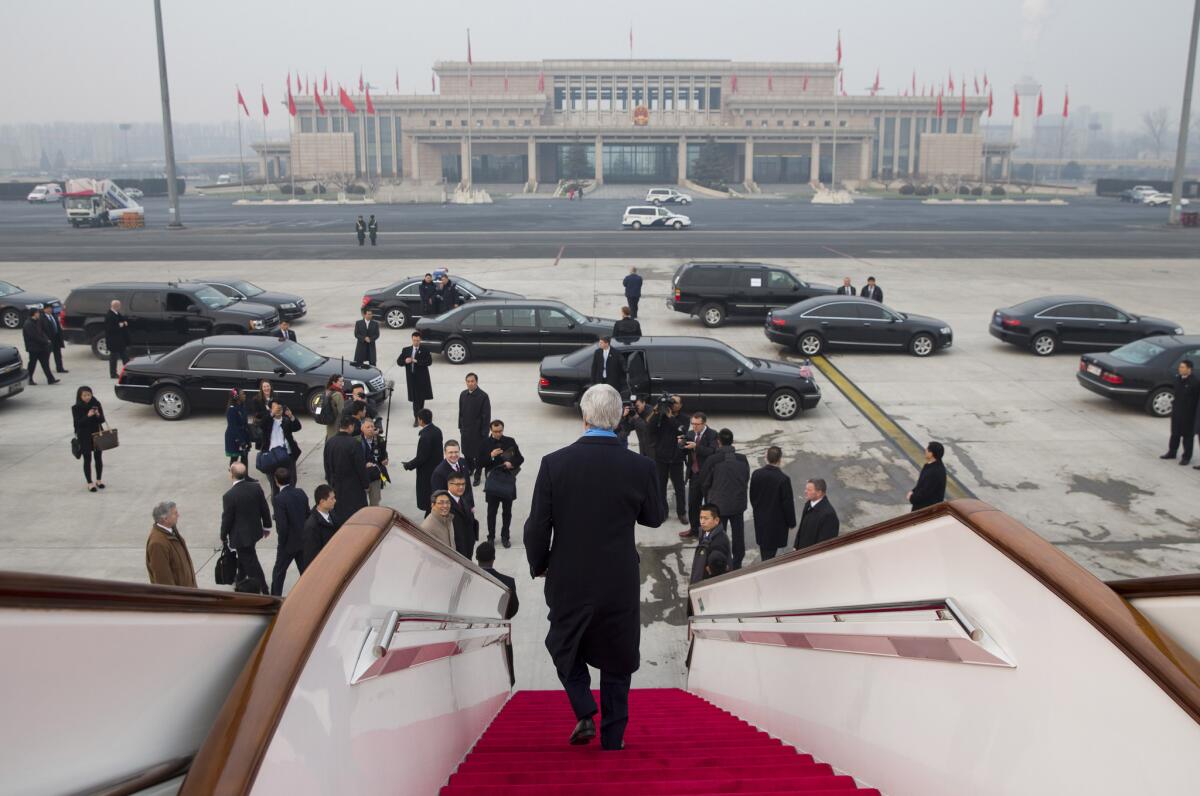Kerry presses China to ease territorial claims, rein in North Korea

- Share via
BEIJING -- Secretary of State John F. Kerry on Friday appealed to China to rein in its North Korean ally and to ease its provocative territorial claims, but after a day of talks Beijing’s response was unclear.
In meetings with President Xi Jinping and other top Chinese officials, Kerry urged them to use their special leverage to restrain Pyongyang, which experts fear is close to another test of a nuclear weapon or missile. He also pressed the leaders to give up controversial claims to territory based on historical maps that U.S. officials contend aren’t legal under international law.
“It’s important to resolve these differences in a peaceful, nonconfrontational way,” Kerry said of the claims, which have driven up tensions between China and neighbors such as Japan, South Korea and the Philippines.
Kerry told reporters that China is worried about North Korea’s military activities and committed to seeing that it eliminates its nuclear program. But while Beijing “is prepared to take additional steps,” U.S. and Chinese leaders are still discussing what those actions will be, he said.
Kerry said the Chinese officials said they committed to following international law in asserting their claims to the land, waters and airspace of the region. But he reported that Beijing also believes it has a strong historical and “factual” claim to the territory, and intends to use those arguments to gain control.
Chinese Foreign Minister Wang Yi told Kerry that China will work with other countries for the region’s stability and “will never allow chaos or war on the Korean peninsula,” the Foreign Ministry said in a statement. But his comment left uncertain what kind of pressure China intends to use, since it uses warnings about potential “chaos” to argue that it should not push Pyongyang too hard.
The government-controlled press complained Friday that the Obama administration was siding with China’s neighbors on the sensitive border issues.
The China Daily newspaper said that Kerry’s position was “nothing short of the United States’ seal of approval for [Japanese Prime Minister] Shinzo Abe’s brinksmanship.”
Kerry said that the talks, ranging across such issue as climate change, the Syrian civil war and Iran’s disputed nuclear program, were positive and productive. But he acknowledged that the world’s two largest economies differ on many issues and are seeking to manage those differences.
“There are differences and we were honest about that today,” he said.
The gaps illustrate the challenges the Obama administration is facing as it tries to increase its influence in heavily armed East Asia, a region brimming with economic promise but also conflict. The administration is trying to move cautiously to strengthen ties with Beijing without alienating its historical allies of Japan and South Korea.
U.S. officials acknowledge that China is their best option for influencing Pyongyang, and point out that Beijing is deeply unhappy with the threatening behavior of its neighbor’s young leader, Kim Jong Un. Yet while U.S. officials say China has effectively restrained North Korea in the past year, there are also limits to its willingness to pressure Pyongyang because of its fears that a collapse could strengthen the position of the United States and South Korea on the peninsula.
U.S. officials say North Korea’s provocations are aimed at squeezing more aid out of the United States and insist they will not submit to such demands. But in the meantime, North Korea continues to expand its plutonium-based nuclear weapons program, a newer uranium weapons program and its ballistic missile program.
Kerry said he specifically warned the Chinese leaders against announcing a new “air defense identification zone” over the East China Sea as they did in November to try to extend their control over the region’s airspace. The United States objected to that announcement, and has flown military aircraft through it to show its rejection of the step.
Twitter: @richtpau
More to Read
Sign up for Essential California
The most important California stories and recommendations in your inbox every morning.
You may occasionally receive promotional content from the Los Angeles Times.











